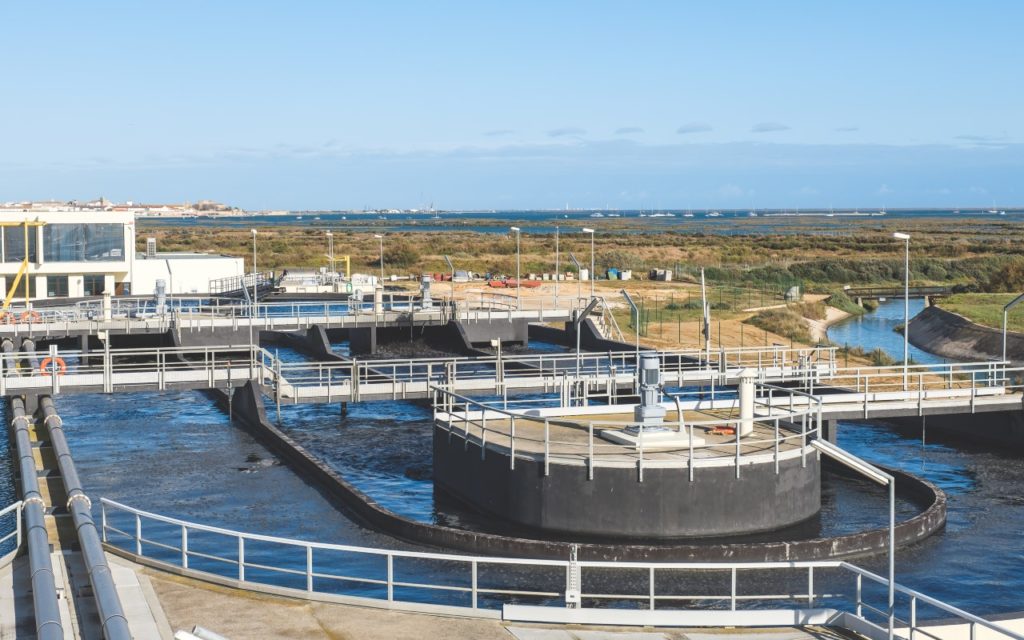The new coranavirus, responsible for Covid-19, is removed in the wastewater treatment process, concluded the research project “SARS Control”, which was, in part, developed in Water Treatment Plants in the Algarve.
The results of this project, which involved the Águas de Portugal Group, the University of Lisbon and the University of Minho, will only be presented tomorrow, March 31st, in an online session starting at 14:00 pm, but the multi-municipal water and sanitation company Algarve anticipated some of the conclusions, namely “the efficiency of removing the load of the virus responsible for Covid-19 in the wastewater treatment processes in WWTP”.
The study also confirmed “that the evolution of the load of SARS-CoV-2 in the wastewater affluent to the monitored WWTPs followed, in the same period, the trends of increase or decrease in the incidence of COVID-19 in the populations of the corresponding regions, as well as the circulation trends of variants of concern (alpha and delta) in the community».
These results “reinforce the usefulness of wastewater-based epidemiology as a complementary monitoring tool for the evolution of the pandemic, confirming the results of previous studies, namely the “Covidetect” project, concerning the creation of an early warning system for the circulation of the SARS virus. -CoV-2 in the community through wastewater analysis».
Those interested in attending tomorrow's session must register here.
According to Águas do Algarve, this project aimed to «contribute to a better understanding of the effectiveness of existing sanitary barriers in WWTPs and to the development of adequate monitoring processes».
On the other hand, “it sought to understand the dynamics of the behavior of the SARS-CoV-2 virus, responsible for Covid-19, along the lines of urban wastewater treatment (liquid phase and solid phase)”.
Started in December 2020, with financial support from the ERDF through the Compete 2020 program, the SARS Control project developed its activities in seven large-scale WWTPs, located in Lisbon, Vila Nova de Gaia, Algarve, Setúbal, Leiria and Guimarães), representing more than 20% of the Portuguese population.
“For eight months, regular monitoring of SARS-CoV-2 was carried out in wastewater and the characterization of the behavioral profile of the virus (measured by quantification of the respective genetic material) in the raw tributary and throughout the treatment stages of each of the WWTP of the project, in a total of about 1.500 samples analyzed», described the Algarve company, which belongs to the Águas de Portugal Group.
«It was found that WWTPs are efficient in removing the viral load, especially in the liquid phase (water), highlighting the primary treatment step, followed by biological treatment. It has also been shown that treatments subsequent to secondary treatment can increase the efficiency of viral load removal”, he added.
“The correlation of SARS-CoV-2 with other microbiological parameters was also analyzed, in order to identify new biomarkers to quickly assess the presence of the virus in the various matrices of wastewater”.
The consortium responsible for SARS Control is led by AdP VALOR, a company of the AdP Group – Águas de Portugal, which is also represented by the sanitation management entities Águas do Algarve, Águas do Centro Litoral, Águas do Norte, Águas do Tejo Atlântico, SIMARSUL and SIMDOURO. From the National Scientific and Technological System, the Center for Ecology, Evolution and Environmental Changes of the Faculty of Sciences of the University of Lisbon (represented by FCiências.ID, Association for the Research and Development of Sciences), the Analysis Laboratory of the Instituto Superior Técnico (LAIST) of the University of Lisbon, and the Center for Biological Engineering of the University of Minho (CEB/UMinho).
Program of the results presentation session:
14:30 pm | Welcome, António Eusébio, President of Águas do Algarve
14:40 pm | “SARS Control, a global vision”, António Martins, Head of the Innovation and Development Department at Águas do Algarve
14:50 pm | “Analytical methodologies and preliminary assessment of the presence of SARS-CoV-2 in the treatment lines of monitored WWTPs”, Ricardo Santos, Head of the Water Microbiology Laboratory of the Analysis Laboratory of Instituto Superior Técnico
15:00 | “Drug analysis and its relationship with the incidence of the pandemic”, Madalena Alves, Full Professor at the Department of Biological Engineering at the University of Minho
15:10 | “Comparative analysis of different treatment solutions in the removal of SARS-CoV-2”, Mónica Vieira Cunha, Professor at the Faculty of Sciences, University of Lisbon
15:20 pm | “Detection of SARS-CoV-2 variants and correlation with other microbiological parameters”, Ana Reis, cE3c Researcher
15:30 pm | “Assessment of the risk to public health of the discharge and use of water for reuse (ApR) and sludge”, Joana Pinto Coelho, Engineering and Operations Department at AdP VALOR
15:40 pm | Questions answers
16:00 | Break
16:15 | Roundtable on the Perspective of the Management Entities involved in the project, moderated by Cristina Gonçalves, Responsible for Exploration of Águas do Norte
17:15 | Closing, Cristiana Barbosa, Administrator of Águas do Norte



















Comments